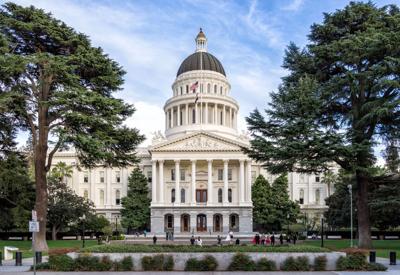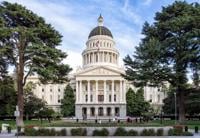
California State Capitol in Sacramento (Andre m / Wikimedia Commons)
This story was originally published by EdSource. Sign up for their daily newsletter.
Lawmakers waited until the final hours of the final day of the legislative session to resolve two of the most contentious TK-12 education issues: confronting rising antisemitism in schools and clamping down on charter school fraud.
Facing a stalemate on the former issue and a standoff between charter schools and unions on the latter, legislators settled for a compromise. They created an Antisemitism Prevention Coordinator in an independent Office of Civil Rights. And on Saturday, one day after the session was to end, they approved the more tempered version of charter reform opposed by the California Teachers Association.
These are the big education bills headed to Gov. Gavin Newsom’s desk for his signature and those that failed to reach his desk. Among them was the passage of the nation’s first ban, within a decade, on ultra-processed food in school meals.
Assembly Bill 715 
Authors: Assemblymembers Rick Chavez Zbur, D-Hollywood, Dawn Addis, D-Morro Bay
What will it do: The bill aims to reduce antisemitism in schools by establishing a new Office of Civil Rights and an Antisemitism Prevention Coordinator, who can help track and report antisemitism in schools, as well as train and advise Local Educational Agencies. It also requires any adopted curriculum to be “factually accurate and align with the adopted curriculum.”
Status: The bill is headed to the governor’s desk.
Why is it important: California has been home to increased rates of antisemitism, including on school grounds.
Upshot: AB 715 has gone through months of revisions to garner opposition support, including from the California Teachers Association, which still opposes the measure. It will continue to be tweaked in the coming months.
— Mallika Seshadri
Assembly Bill 84, Senate Bill 414 
Authors: Assemblymember Al Muratsuchi, D-Torrance (AB 84); Sen. Angelique Ashby, D-Sacramento (SB 414)
What they would do: Both AB 84 and SB 414 ended up containing many of the same elements for increasing oversight of charter schools, including expanding auditing requirements; improving data collection on enrollment, student-teacher ratios, and achievement in nonclassroom-based charters; and banning spending on entertainment unrelated to instruction, such as theme parks. SB 414 also creates an Inspector General’s Office to investigate allegations of fraud in all public schools. AB 84, pushed by labor unions, would impose more stringent charter approval and renewal requirements, which charter schools oppose.
Status: SB 414 passed after arguments on the floor continued late Friday night into Saturday. AB 84, lacking enough support, wasn’t put to a vote and can be brought up again next year.
Why is it important: The bills follow several studies, big scandals and four years of moratoriums on non-classroom charters.
Upshot: Charter school advocates, authorizers and legislators spent more than 100 hours trying unsuccessfully to compromise on a single merged bill. Legislative leaders viewed SB 414 as the practical solution. The California Teachers Association will lobby Gov. Gavin Newsom to veto it.
— Kathryn Baron and Diana Lambert
Assembly Bill 49 
Authors: Assemblymembers Al Muratsuchi, D-Torrance, Liz Ortega, D-Hayward, Celeste Rodriguez, D-Arleta; Sen. Lena Gonzalez, D-Long Beach
What it will do: The bill would prohibit schools from allowing immigration enforcement officers to enter a school campus or question a student unless they have a judicial warrant or court order. It would also prohibit schools from sharing information about a student, family or employee with immigration officials, unless the officials present a judicial warrant or court order.
Status: The bill is headed to the governor’s desk.
Why is it important: All children living in the U.S. have a right to attend public schools, regardless of immigration status, as determined by the U.S. Supreme Court. The Trump administration ended a longstanding policy not to conduct immigration enforcement at schools or churches, raising concerns that some families will avoid school.
Upshot: It’s unclear whether the governor will sign the bill. He has not commented on it.
— Zaidee Stavely
SENATE Bill 98 
Author: Sen. Sasha Renée Pérez, D-Pasadena
What it will do: The bill would require school districts, California State University, each California community college district, and each Cal Grant qualifying institution of higher education, as well as request the University of California, to issue a notification to all students, faculty and other campus community members when the presence of federal immigration enforcement is confirmed on campus. These notifications must include the date, time and location of enforcement on campus, as well as a link to additional resources for students and campus community members.
Status: The bill is headed to the governor’s desk.
Why is it important: While most schools provide guidelines to students, faculty and staff about how to engage with federal immigration enforcement officers if encountered on campus, there is no legal requirement to notify the community. With ongoing raids and continued fears of detention and deportation in immigrant communities, the bill aims to bolster a sense of security and maintain school campuses as “safe spaces” for students.
Upshot: It’s unclear whether the governor will sign the bill. He has not commented on it.
— Vani Sanganeria
SENATE Bill 323 
Author: Sen. Sasha Renée Pérez, D-Pasadena
What it would do: The bill would revise the California Dream Act Application, clarifying that the form is open to any student who is eligible for state aid, regardless of their eligibility for federal financial aid.
Status: The bill is not going to the governor’s desk.
Why is it important: The bill aims to address concerns that U.S. citizens from mixed-status families — such as students with undocumented parents or spouses — may not apply for federal student aid due to technical barriers and worries about data privacy. Heightened immigration enforcement has raised fears that the data students submit to access federal aid could be used to target undocumented family members. Although the California Dream Act Application is open to mixed-status families, the California Student Aid Commission says the lack of a defined and uniform state policy has created uncertainty for students trying to understand their financial aid options.
Upshot: The bill never made it to a full vote in the Assembly.
— Amy DiPierro
Assembly bill 477 
Authors: Assemblymembers Al Muratsuchi, D-Torrance, Dawn Addis, D-Morro Bay
What it would do: The bill would have increased California teacher and classified school employee salaries by 50% over the next decade. It would also have increased statewide school funding incrementally through the 2036-37 school year, allowing school districts to increase staff pay.
Status: The bill is not going to the governor’s desk.
Why is it important: Teachers earn 23.5% less than other college graduates with comparable degrees, which keeps many graduates from entering the teaching profession, according to a legislative analysis of the bill.
Upshot: The bill, which would have cost the state $38 billion annually, was held by the Senate Appropriations Committee.
— Diana Lambert
Assembly bIll 495 
Author: Assemblymember Celeste Rodriguez, D-Arleta
What it will do: The bill would expand the number of relatives who can sign a “caregiver’s authorization affidavit” and be able to enroll a child in school and make school-related medical decisions on behalf of a child to include all adults related to a child by blood or adoption, within five generations, or “degrees of kinship.” This would include great- or great-great aunts or uncles, and spouses of these relatives, in addition to stepparents, stepsiblings and other relatives. It would also authorize a court to appoint a person nominated by a parent to have joint custody of a child if the parent is unavailable due to circumstances such as immigration detention or deportation, and make it easier for the parent to terminate those rights when they are available again.
Status: The bill is headed to the governor’s desk.
Why is it important: The bill was created to expand protections for children whose parents or guardians are detained or deported by U.S. Immigration and Customs Enforcement. However, it faced considerable opposition from conservative religious groups that argued that the bill would limit parental rights and allow other adults to make medical decisions for children.
Upshot: The bill was amended to remove “non-relatives” and only allow relatives to sign caregivers’ authorization affidavits. It’s unclear whether the governor will sign the bill.
— Zaidee Stavely
Senate Bill 510 
Author: Sen. Laura Richardson, D-Torrance
What it will do: The bill requires that the Instructional Quality Commission consider including the historical contributions of African Americans in early California history when it revises the curriculum framework in history-social science or adopts new instructional materials.
Status: The bill was signed by the governor.
Why is it important: Textbooks and other instructional materials often minimize the contributions of African Americans. The legislation would help to make history instruction more accurate and inclusive.
Upshot: The legislation passed both houses without a no vote. Gov. Gavin Newsom signed the legislation on Aug. 28.
— Diana Lambert
Senate Bill 577 
Author: Sen. John Laird, D-Monterey
What it would do: It would require that lawsuits seeking damages suffered as a result of childhood sexual assault by an employee of public agencies, including schools, that occurred before Jan. 1, 2024, be initiated before the plaintiff turns 40, or, after having turned 18, within five years of the date the plaintiff discovers or reasonably should have discovered that psychological injury or illness from the sexual assault, whichever period expires later. Existing law sets no limit on when such a suit can be filed.
Status: The bill is not going to the governor’s desk.
Why is it important: The costs to school districts from such suits are expected to exceed $4 billion and could go higher. The Los Angeles Unified School District has approved $500 million in judgment obligation bonds for settlements. The bonds must be repaid from the district’s general fund. Small districts are struggling to fund settlements.
Upshot: The bill appeared headed for passage after it was passed 14-1 by the Assembly Appropriations Committee in August. But Assemblymember Dawn Addis, D-Morro Bay, led efforts to stop it, telling The Imprint that survivors who have suffered abuse by employees of public agencies “deserve a chance at justice.”
— Thomas Peele
Senate Bill 640
Author: Sen. Christopher Cabaldon, D-Napa
What it will do: The bill aims to make it easier for qualified California high school students to get admitted to California State University. Eligible high school students — those who have taken the required courses and maintained an appropriate grade point average — will receive mailers directly admitting them to participating CSU campuses.
Status: The bill is headed to the governor’s desk.
Why is it important: Cabaldon reasons that many students who are academically qualified to attend CSU don’t enroll due to difficulties navigating the admissions process. The measure follows a fall 2024 direct admission pilot program in Riverside County. Other provisions of the bill would build on an existing dual admission transfer pathways program at CSU.
Upshot: Cabaldon has touted a 2022 study that found similar direct admissions programs in Idaho boosted undergraduate and in-state enrollment.
— Amy DiPierro
Senate Bill 790 
Author: Sen. Christopher Cabaldon, D-Napa
What it would do: The bill clears the way for the governor to sign onto an existing interstate agreement that sets standards for online college courses and degrees, but only under certain conditions. For example, the state would have to confirm that joining the agreement would not block California from enforcing its own consumer protection laws.
Status: The bill is not going to the governor’s desk.
Why is it important: California is the only state that hasn’t joined the pact, which is called the State Authorization Reciprocity Agreement, or SARA. The bill’s author says joining SARA would make it easier for California colleges to enroll out-of-state students in online courses.
Upshot: Held by the Assembly Appropriations Committee.
— Amy DiPierro
Assembly Bill 1224 
Authors: Assemblymembers Avelino Valencia, D-Anaheim, Robert Garcia, D-Rancho Cucamonga, Anamarie Ávila Farías, D-Concord
What it will do: The legislation would help fill vacant teaching positions by doubling the number of days a substitute can teach in a single classroom from 30 to 60 in general education, and from 20 to 60 in special education. The legislation would go into effect on Jan. 1 and require school districts to report substitute usage in 2026-27.
Status: The bill is headed to the governor’s desk.
Why is it important: California continues to have a shortage of teachers, particularly in hard-to-fill jobs like special education, science and math.
Upshot: The bill has been the subject of passionate debate. Supporters said the bill reduces instability and disruptions in classrooms. Opponents said that allowing a substitute without the required preparation to teach a class for as long as a third of the school year would be harmful to children academically.
— Diana Lambert
Assembly Bill 1264 
Author: Assemblymember Jesse Gabriel, D-Encino
What it will do: The bill would require the Office of Environmental Health Hazard Assessment to adopt regulations for ultra-processed foods (UPFs), defined as any food or beverage high in saturated fats, sodium, or specific added sugars or sweeteners. It would require schools to begin phasing out harmful UPFs by Jan. 1, 2028. Starting July 1, 2035, the bill would prohibit a school district, county superintendent of schools, or charter school from offering a “nutritionally adequate” breakfast or lunch that includes harmful ultra-processed foods or selling food or beverages with UPFs, except as part of a school fundraiser.
Status: The bill is headed to the governor’s desk.
Why is it important: Nutrition experts point to the harmful effects of ultra-processed food, particularly among children. These effects include a higher risk of obesity, diabetes and heart disease, which disproportionately impact students from low-income communities.
Upshot: Gabriel said he accepted 50 amendments to address concerns by food and agriculture lobbies. It passed with bipartisan support, including Republicans who tied it to MAHA, President Donald Trump’s Make America Healthy Again campaign.
— Vani Sanganeria
Assembly Bill 1348 
Author: Assemblymember Jasmeet Bains, D-Bakersfield
What it will do: School districts, county offices of education and charter schools can currently request average daily attendance (ADA) credit to make up for decreases in attendance reaching 10% of the student population that occur due to a specified list of reasons. This bill would add immigration enforcement actions to that list, which includes fires, floods, epidemics, earthquakes, and more, by June 30, 2029. When such a request for ADA credit is made, students must also be offered independent study.
Status: The bill is headed to the governor’s desk.
Why is it important: Following this year’s sharp rise in immigration enforcement actions, plus the Trump administration ending a decades-long policy to avoid immigration enforcement in or near schools, there are heightened concerns that children are missing school to avoid encounters with immigration agents.
Upshot: The bill was amended to define immigration enforcement, cap ADA credits at 10 days for each student and specify instructional requirements. It was also amended to exempt from California’s Public Records Act any documentation submitted to the state superintendent related to immigration enforcement that results in school closures or a material decrease in attendance.
— Betty Márquez Rosales
Assembly Bill 1454 
Authors: Assembly Speaker Robert Rivas, D-Salinas, and Assemblymembers Al Muratsuchi, D-Torrance, Blanca Rubio, D-Baldwin Park
What it will do: It will provide missing links to California’s comprehensive early literacy reforms, which are effective in other states. The bill would provide teachers with evidence-based resources and training in reading instruction, including phonics in kindergarten and first grade. The State Board of Education would select a new list of instructional materials tied to what’s commonly called the science of reading. Districts must select from the list or justify their choices. The state would update reading instruction in administrators’ credentialing programs.
Status: It passed the Senate unanimously, 38-0, and is headed to Gov. Gavin Newsom.
Why is it important: The ability to read at grade level is a critical marker for success in school. Yet only 4 in 10 California third graders do so. The proficiency gap in reading between Black and Hispanic students compared with white and Asian students is among the nation’s widest.
Upshot: Gov. Gavin Newsom is expected to sign the legislation with fanfare and also has allocated $200 million in the 2025-26 state budget for teachers’ literacy training. Supporters will monitor the implementation stages to ensure the state is meeting the law’s requirements.
— John Fensterwald











(0) comments
Welcome to the discussion.
Log In
Keep it Clean. Please avoid obscene, vulgar, lewd, racist or sexually-oriented language.
PLEASE TURN OFF YOUR CAPS LOCK.
Don't Threaten. Threats of harming another person will not be tolerated.
Be Truthful. Don't knowingly lie about anyone or anything.
Be Nice. No racism, sexism or any sort of -ism that is degrading to another person.
Be Proactive. Use the 'Report' link on each comment to let us know of abusive posts.
Share with Us. We'd love to hear eyewitness accounts, the history behind an article.